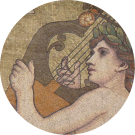Τεκμήριο
Για να παραπέμψετε στο παρόν τεκμήριο παρακαλούμε χρησιμοποιήστε τα παρακάτω αναγνωριστικά:
http://hdl.handle.net/11636/630| Τίτλος: | Perna perna hē melissa |
| Εναλλακτικός τίτλος: | The bee goes by |
| Χρονολογία: | 1900 |
| Δημιουργός: | Traditional |
| Συντελεστής: | Στιχουργός: Traditional |
| Λέξεις κλειδιά: | goes by bee baby bees baby chicks |
| Τόπος δημιουργίας: | Greece |
| Μουσικό μέτρο: | 4/4 |
| Πρώτες λέξεις: | The bee goes by- goes by |
| Φωνητική έκταση: | 5th perfect |
| Ψυχοπαιδαγωγικοί στόχοι: | Socialization and Cooperation (through team work). Respecting the game rules Movement control. |
| Μουσικοί στόχοι: | 4/4 meter. Pick-up meter. Doted eighth. Breathing. Kodály method - Hand Signs. Articulation. Sense of rhythm. |
| Ιδέες διδασκαλίας: | Vocal exercises for the accurate pronunciation of the vowels and pitch singing. Voice positioning. Perfect fourth interval. Performance of the song with variations in dynamics; first f and then p. Learning to perform the song on a melodic instrument. Class in two groups; the first group claps during quarters, the second group claps on the eights and vice versa. Recognition of the melodic intervals using the Kodály or Orff methods. The first group sings, while the second performs an ostinato on glockenspiel (e.g. G-D, on quarters). Performance the song in canon. Adapting new lyrics to the melody. Reproduction of the sound of the bee on percussion instruments. Creation of a collage with pictures of the life of bees. Visual representation of the song. Familiarization with Nikolai Rimsky-Korsakov’s “Flight of The Bumblebee” through audiovisual material. Learning and performing the traditional game “Perna-perna I melissa”: Two children are chosen in the group after a counting-out game (e.g. O Karakatsanis). The rest of the children step along the beat of the song on a row, and pass by the two leaders who stand face to face. The two leaders would choose a name for each group. Then they would clap hands alternatively (one clapping of their hands, one clapping of their co-leader hands) while singing the song. When the verse finishes they would caught the child that passes by with the last verse. They would ask the child “Do you prefer ‘apple’ or ‘strawberry’?”. The child goes behind the group leader, according to the group they chose. This must take place secretly, because the other children should not hear the names of the two groups. The playsong continues until all the children go behind one of the two leaders. Then the two leaders hold hands, the children behind hold their bodies, and they all pull towards their side. Winning group is the group who manages to pull the other group towards their side. . |
| Διαθεματικές έννοιες: | Tradition (playsongs). Interaction (through playing) Communication |
| Εμφανίζεται στις συλλογές: | Τα τραγούδια |
Ψηφιακά Αρχεία
| Αρχείο | Description | Μέγεθος | Τύπος αρχείου | |
|---|---|---|---|---|
| Perna perna hē melissa.mp3 | Αρχείο ήχου | 161.12 kB | Unknown | Δείτε/Ανοίξτε |
| Perna perna hē melissa.xml | 12.06 kB | XML | Δείτε/Ανοίξτε | |
| Perna perna hē melissa.mscz | 7.66 kB | Unknown | Δείτε/Ανοίξτε | |
| Perna perna hē melissa.mus | 42.15 kB | Unknown | Δείτε/Ανοίξτε | |
| Perna perna hē melissa.pdf | 23.85 kB | Adobe PDF | Δείτε/Ανοίξτε |

